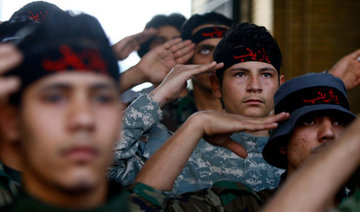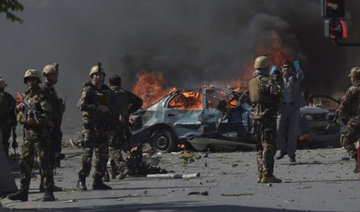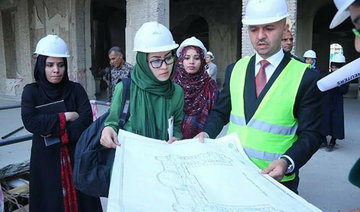KABUL: Afghanistan is considering training and arming 20,000 civilians to defend territories where Islamic militants have been driven out, officials say, sparking fears the local forces could become another thuggish militia.
The proposal for a government-backed armed group that would protect its own communities from the Taliban and the Daesh group comes as Afghanistan’s security forces, demoralized by killings and desertions, struggle to beat back a rampant insurgency.
But the proposal has raised concerns that the local forces could become unruly and turn into another abusive militia terrorizing the people it is supposed to defend.
“The Afghan government’s expansion of irregular forces could have enormously dangerous consequences for civilians,” said Patricia Gossman, a senior researcher at Human Rights Watch.
The New York-based group said Western diplomats in Kabul familiar with the plan — modelled on the Indian Territorial Army that supports the country’s regular forces — said Afghan officials had expressed concerns the militia could be used by “powerful strongmen” or become “dependent on local patronage networks.”
American and Afghan officials told AFP the fighters would come under the command of the Afghan army and be better trained than the Afghan Local Police — a village-level force set up by the US in 2010 and accused of human rights violations.
“Right now we rely on commandos and air strikes to retake the lost territories but after the commandos leave we don’t have enough forces to hold onto the territories,” said a senior Defense Ministry official who asked not to be named.
“The force will operate under an army corps and will be used to fill the gaps. They will be recruited from the locals and will be numbered around 20,000.”
Defense Ministry spokesman Dawlat Waziri confirmed to AFP that a plan for “local forces” was being discussed.
“People will be recruited from their areas because they know their regions and how to keep them,” Waziri said, but added there was no guarantee it would be implemented.
A spokesman for NATO’s Resolute Support train and assist mission also confirmed a proposal for an Afghan territorial army was on the table.
But another American official, who spoke on the condition of anonymity, told AFP the idea was still in “the brainstorming phase.”
The Afghan government and its foreign backers have been cultivating militias to bolster the 330,000-strong Afghan National Security and Defense Forces as they battle to get the upper hand in the grinding conflict.
In Afghanistan, militias — private armies and government-backed armed groups — have a long and chequered history in the war-torn country and many Afghans are wary of them.
Civilian casualties were at record highs in the first six months of 2017, a UN report showed, with forces loyal to the Afghan government accounting for nearly 20 percent of the deaths and injuries.
Since NATO ended its combat mission in 2014 the Taliban has been gaining ground and Daesh is expanding its footprint.
As of February only about 60 percent of Afghanistan’s 407 districts were reported to be under government control, according to the US watchdog agency SIGAR.
Earlier this year Afghan President Ashraf Ghani ordered a near doubling of the country’s elite fighting force from 17,000 as part of a four-year roadmap that also aims to strengthen Afghanistan’s air force.
While US President Donald Trump’s commitment to increase American troop numbers and leave them there indefinitely has been welcomed by Afghan authorities, they know it will take time to improve the fighting abilities of their security forces.
With parliamentary and presidential elections planned in the next two years they want a security quick fix.
But critics fear that rather than support Afghanistan’s beleaguered security forces, the militia could aggravate factionalism and push Afghanistan deeper into conflict.
“It’s a tool that the US military and successive Afghan governments have reached for and it looks like a solution to their problems but actually the real solution would be to have a functioning ANA (Afghan National Army) and ANP (Afghan National Police),” Kate Clark, a senior analyst at Afghanistan Analysts Network, told AFP.
“It’s a dangerous thing to play with, arming your civilians.”
Kabul mulls plan to arm 20,000 civilians to fight insurgents
Kabul mulls plan to arm 20,000 civilians to fight insurgents

Japan’s Foreign Minister avoids sanctioning Israel, criticizes Iran’s nuclear “ambitions”

- “We do not permit Iran’s nuclear development, and we believe that solving this through discussion is crucial,” Takeshi stated
- “Moving forward, we will continue to exert all necessary diplomatic efforts”
TOKYO: Japanese Foreign Minister Iwaya Takeshi avoided condemning or approving sanctioning Israel in a press conference on Tuesday, shifting the emphasis onto Iran’s alleged pursuit of a nuclear weapon.
“We do not permit Iran’s nuclear development, and we believe that solving this through discussion is crucial,” he stated, emphasizing the potential for peaceful resolutions. “Moving forward, we will continue to exert all necessary diplomatic efforts to prevent further deterioration of the situation (between Iran and Israel.)”
When asked by Arab News Japan about the possibility of Israel using nuclear weapons in its conflict with Iran, as well as potentially targeting other countries like Pakistan and Egypt, as suggested by some reports, Iwaya opted not to answer directly. Instead, he stated, “Our country believes that the current tense situation in the Middle East is detrimental to the international community as a whole. We strongly urge all parties involved, including Israel, to exercise maximum restraint and to de-escalate the situation,” highlighting the urgency of the situation.
The Japanese Foreign Minister also said he strongly urged de-escalation when he spoke with Iran’s Foreign Minister on Monday, adding that Japan has “also been making efforts with Israel,” without specifying what those efforts entail or outlining how Japan might influence the situation. Rather, he emphasized Japan’s closeness to Israel.
“Israel is, of course, a friendly nation to our country, and we have had long-standing diplomatic relations with Iran, so we believe it is essential for Japan to work toward resolving issues through dialogue and consultation,” he stated.
“The peace and stability of the Middle East are extremely important to our country. The situation is becoming increasingly tense, particularly in Iran. We plan to raise the danger level further and issue evacuation adviseries for the Japanese for the entire country of Iran soon.”
Minister Iwaya was confronted about why Japan agreed with its G-7 partners to support so-called Israel’s self-defense and condemn Iran after Tokyo initially condemned Israel immediately when it launched a preemptive attack on Iran.
The Japanese Foreign Minister justified the change in the position, saying: “Initially, there were attacks from Israel that we condemned, but Iran retaliated, and this back-and-forth continues to this day. We believe that both Israel and Iran should ensure that they are engaged in dialogue and consultation to resolve issues.”
This situation is a source of significant concern for us, Iwaya continued. Regarding the G7 leaders’ statement, it is a consensus that reflects the discussions among the leaders considering the current situation. It reiterates the G7’s commitment to peace and stability in the Middle East.
700 foreigners flee Iran to Azerbaijan, Armenia; evacuation from Israel begins

- A Czech plane carrying 66 people landed in Prague on Tuesday a day after a Slovak plane had taken 73 evacuees to Bratislava from Amman
BAKU: More than 700 foreign nationals have crossed from Iran into neighboring Azerbaijan and Armenia since Israel began striking the country last week, government officials in Baku and Yerevan said on Tuesday.
The Caucasus countries border Iran’s northwest, with the closest crossing into Azerbaijan around 500 km from Tehran by road.
“Since the start of the military escalation between Israel and Iran, more than 600 citizens of 17 countries have been evacuated from Iran via Azerbaijan,” a government source said on Tuesday.
The evacuees, who crossed the border via the Astara checkpoint on the Caspian Sea coast, are being transported to Baku airport and “flown to their home countries on international flights,” the source said.
Among those evacuated are citizens of Russia, Belarus, Kazakhstan, Kyrgyzstan, Tajikistan, Uzbekistan, as well as Germany, Spain, Italy, Serbia, Romania, Portugal, the US, the UAE, China and Vietnam. Azerbaijan shut its land borders in 2020 due to the COVID-19 pandemic and has kept them closed ever since.
“In light of the evacuation need, Azerbaijan has temporarily opened its border for those leaving Iran,” the official said.
India also evacuated 110 of its citizens from Iran through Armenia, Ani Badalyan, Yerevan’s Foreign Ministry said. Poland’s Foreign Ministry said it would evacuate part of its embassy staff in Tehran via Baku.
“We have decided to evacuate or support the departure of staff who do not need to remain in the country, so-called non-essential personnel,” Deputy Foreign Minister Henryka Moscicka-Dendys said.
“Our colleagues will try to reach the border with Azerbaijan,” she said, without specifying how many people were involved.
Turkmenistan — one of the world’s most closed-off countries — said it had also allowed the transit of around 120 people evacuated from Iran through its territory, mainly citizens of Central Asian countries.
The Czech Republic and Slovakia have taken 139 people home on government planes from Israel because of its conflict.
A Czech plane carrying 66 people landed in Prague on Tuesday a day after a Slovak plane had taken 73 evacuees to Bratislava from Amman.
“I am glad they are all OK. The transport was really demanding in the difficult environment,” Czech Defense Minister Jana Cernochova said about the Czech flight on social media site X.
The Defense Ministry said most of the 66 evacuees were Czech nationals. “It was not possible to send the army plane straight to Israel,” the ministry said, citing the air-space closure.
“The evacuees were taken to the airport in the neighboring country by buses. They crossed the border on foot.”
Czech media said a convoy with the evacuees had left Tel Aviv on Monday morning and boarded the plane in Sharm El-Sheikh, Egypt.
A Slovak government plane with 73 passengers, mostly Slovaks, landed in Bratislava on Monday.
France urged to apologize for Polynesia nuclear tests

- Tens of thousands of people in the French overseas territory are estimated to have been exposed to harmful levels of radiation
- France conducted 193 nuclear tests in French Polynesia from 1966 until 1996
PARIS: Paris should apologize to French Polynesia for the fallout of nuclear tests there over three decades, which led to harmful radiation exposure, a French parliamentary report released on Tuesday said.
France conducted 193 nuclear tests in French Polynesia from 1966, especially at the Pacific archipelago’s Moruroa and Fangataufa atolls, to help build up its atomic weapon arsenal. These included atmospheric and underground tests which had severe health impacts.
Tens of thousands of people in the French overseas territory are estimated to have been exposed to harmful levels of radiation, leading to a significant public health crisis that has been largely ignored.
The tests remain a source of deep resentment in French Polynesia, where they are seen as evidence of racist colonial attitudes that disregarded the lives of islanders.
“The inquiry has strengthened the committee’s conviction that a request for forgiveness from France to French Polynesia is necessary,” the report said.
“This request is not merely a symbol, nor a request for repentance. It must be a... fundamental step in the process of reconciliation between French Polynesia and the State,” the authors said.
The report said the apology must be added to a 2004 law on French Polynesia’s semi-autonomous status.
Residents in the south Pacific Ocean islands are hoping for compensation for radiation victims.
The investigative website Disclose, citing declassified French military documents on the nearly 200 tests, reported in March that the impact from the fallout was far more extensive than authorities let on.
Only a few dozen civilians have been compensated for radiation exposure since the tests ended in 1996, Disclose said.
Four heavy US bombers stationed at key Indian Ocean base: image analysis

- The Pentagon said it was sending 'additional capabilities' to the Middle East amid an escalation of the Iran-Israel conflict
PARIS: Four US Stratofortress bombers are currently stationed at the Diego Garcia base in the Indian Ocean, according to an AFP analysis of satellite imagery, as the conflict between Israel and Iran extended to its fifth straight day.
The base, leased to the United States by Britain, is one of its key military facilities in the Asia-Pacific region, and was used as a hub for long-range bombers and ships during the wars in Afghanistan and Iraq.
The four B52H Stratofortresses, which can carry nuclear weapons or other precision-guided munitions, were spotted on a southern tarmac at Diego Garcia on Monday at 0922 GMT.
Images provided by Planet Labs indicate they arrived in mid-May.
A C-17 Globemaster III troop and cargo transport plane is also at the base, according to the AFP analysis, as well as six jets likely to be KC-135 airborne refueling tanker.
The Pentagon said Monday that it was sending “additional capabilities” to the Middle East amid an escalation of the Iran-Israel conflict, while the aircraft carrier USS Nimitz canceled a Vietnam visit to head toward the Indian Ocean according to Marine Traffic, a ship-tracking site.
Washington has also redeployed around 30 refueling planes toward bases in Europe.
US spies said Iran wasn’t building a nuclear weapon, Trump dismisses that assessment

- The country was not building a nuclear weapon, the national intelligence director told lawmakers
- Gabbard brushed off the inconsistency, blaming the media for misconstruing her earlier testimony and asserting that “President Trump was saying the same thing that I said“
WASHINGTON: Tulsi Gabbard left no doubt when she testified to Congress about Iran’s nuclear program earlier this year.
The country was not building a nuclear weapon, the national intelligence director told lawmakers, and its supreme leader had not reauthorized the dormant program even though it had enriched uranium to higher levels.
But President Donald Trump dismissed the assessment of US spy agencies during an overnight flight back to Washington as he cut short his trip to the Group of Seven summit to focus on the escalating conflict between Israel and Iran.
“I don’t care what she said,” Trump told reporters. In his view, Iran was “very close” to having a nuclear bomb.
Trump’s statement aligned him with Israeli Prime Minister Benjamin Netanyahu, who has described a nuclear-armed Iran as an imminent threat, rather than with his own top intelligence adviser. Trump was expected to meet with national security officials in the Situation Room on Tuesday as he plans next steps.
Gabbard brushed off the inconsistency, blaming the media for misconstruing her earlier testimony and asserting that “President Trump was saying the same thing that I said.”
“We are on the same page,” she told CNN. Asked for comment, Gabbard’s office referred to those remarks.
In her March testimony to lawmakers, Gabbard said the intelligence community “continues to assess that Iran is not building a nuclear weapon and Supreme Leader Khamenei has not authorized the nuclear weapons program he suspended in 2003.”
She also said the US was closely monitoring Iran’s nuclear program, noting that the country’s “enriched uranium stockpile is at its highest levels and is unprecedented for a state without nuclear weapons.”
Trump’s contradiction of Gabbard echoed his feuds with US spy leaders during his first term, when he viewed them as part of a “deep state” that was undermining his agenda. Most notably, he sided with Russian President Vladimir Putin in 2018 when asked if Moscow had interfered in the 2016 election, saying Putin was “extremely strong and powerful in his denial.”
The latest break over Iran was striking because Trump has staffed his second administration with loyalists rather than establishment figures. Gabbard, a military veteran and former Democratic congresswoman from Hawaii, was narrowly confirmed by the Republican-controlled Senate because of her scant experience with intelligence or managing sprawling organizations.
Gabbard, who left the Democratic Party in 2022 and endorsed Trump in last year’s election, is expected to testify Tuesday in a closed session on Capitol Hill, along with CIA Director John Ratcliffe, during a previously scheduled budget hearing.
Both officials likely would face questions about their views on Iran and Trump’s latest statements. A representative for the CIA did not immediately respond to requests for comment.
The head of the International Atomic Energy Agency has repeatedly warned that Iran has enough enriched uranium to make several nuclear bombs should it choose to do so. Iran maintains its nuclear program is peaceful.
An earlier intelligence report, compiled in November under then-President Joe Biden, a Democrat, also said Iran “is not building a nuclear weapon.”
However, it said the country has “undertaken activities that better position it to produce one, if it so chooses,” such as increasing stockpiles of enriched uranium and operating more advanced centrifuges. The report did not include any estimates for a timeline for how quickly a bomb could be built.
Trump’s immigration agenda is another place where he’s split with intelligence assessments. He cited the Alien Enemies Act, a 1798 wartime law, to deport Venezuelan migrants, which he justified by claiming that the Tren de Aragua gang was coordinating with the Venezuelan government. However, an intelligence assessment in April found no evidence of that.
Gabbard fired the two veteran intelligence officers who led the panel that created the assessment, saying they were terminated because of their opposition to Trump.
In response to those reports, the White House released a statement from Gabbard supporting the president.
“President Trump took necessary and historic action to safeguard our nation when he deported these violent Tren de Aragua terrorists,” the statement said. “Now that America is safer without these terrorists in our cities, deep state actors have resorted to using their propaganda arm to attack the President’s successful policies.”






















